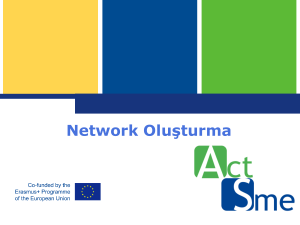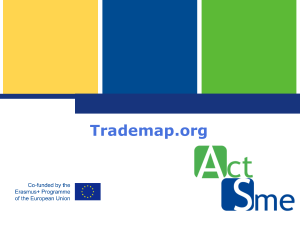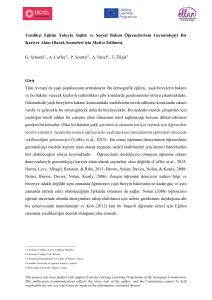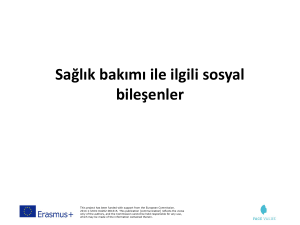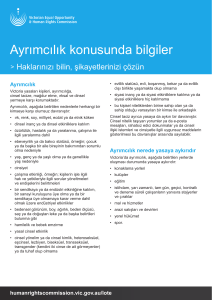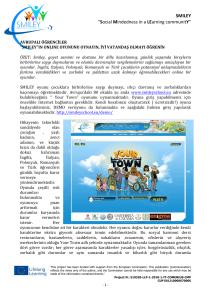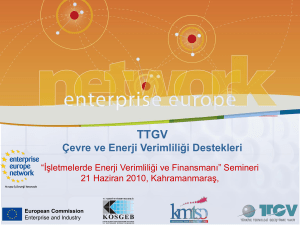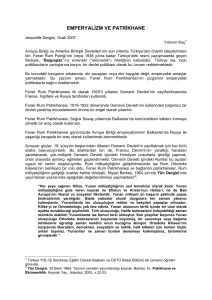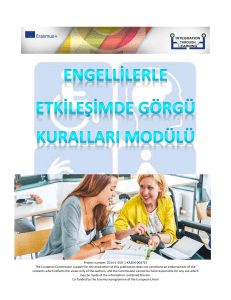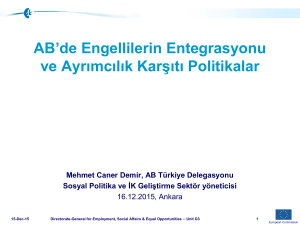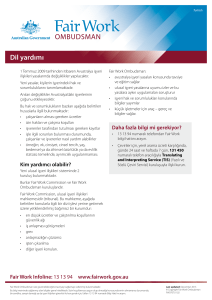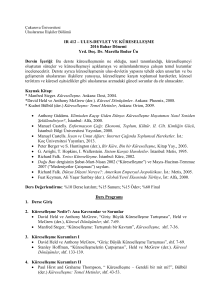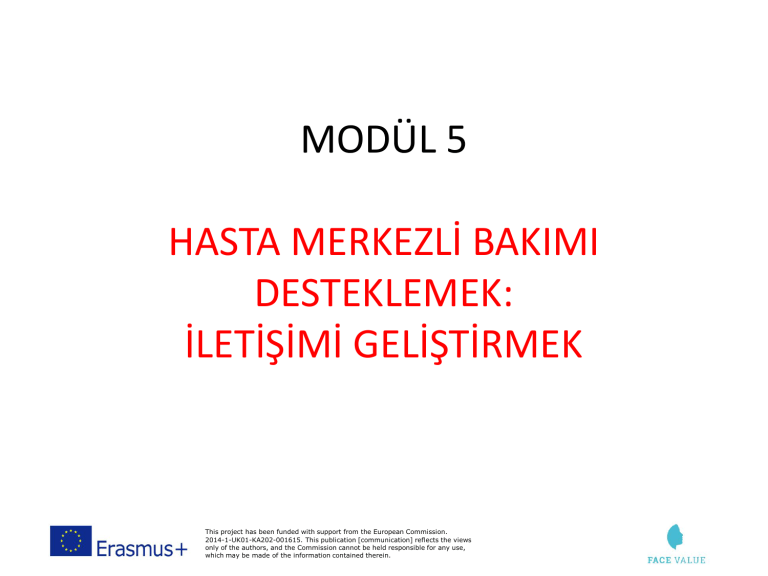
MODÜL 5
HASTA MERKEZLİ BAKIMI
DESTEKLEMEK:
İLETİŞİMİ GELİŞTİRMEK
This project has been funded with support from the European Commission.
2014-1-UK01-KA202-001615. This publication [communication] reflects the views
only of the authors, and the Commission cannot be held responsible for any use,
which may be made of the information contained therein.
This project has been funded with support from the European Commission.
2014-1-UK01-KA202-001615. This publication [communication] reflects the views
only of the authors, and the Commission cannot be held responsible for any use,
which may be made of the information contained therein.
ETKİLİ İLETİŞİM…
…temel beceri hastayı daha çok bakımın
merkezine koyabilmektir
– Hastaya “onu duyduğumuzu” hissettirir
– Kendi bakımları hakkında kontrol duygusunu
geliştirir
– Tedavileri hakkında karar alma sürecine
katılımlarını sağlar
– Bakımla ilgili memnuniyetlerini arttırabilir.
This project has been funded with support from the European Commission.
2014-1-UK01-KA202-001615. This publication [communication] reflects the views
only of the authors, and the Commission cannot be held responsible for any use,
which may be made of the information contained therein.
ÖĞRENME KONULARI
1.
2.
3.
4.
5.
İletişim türleri
Başkalarını yargılamak: İlk izlenimler & klişeler
İyi iletişim için engeller
Konjenital durumlar ve iletişim
İletişimi geliştirmek
o Açıklık; kaygıları tanımlamak; kapalılık
o Çocuklar ve aileler ile
o Genç hastaların sesini duyurmasını desteklemek
6. Hastalara iletişim becerilerini öğretmek
This project has been funded with support from the European Commission.
2014-1-UK01-KA202-001615. This publication [communication] reflects the views
only of the authors, and the Commission cannot be held responsible for any use,
which may be made of the information contained therein.
Hasta Merkezli İletişim Ne demek?
“İletişim hastayı kendi bakım sürecinde karar
alımına katılmaya, görüş bildirmeye davet eder
ve onu cesaretlendirir”
(Langwitz et al, 1998)
This project has been funded with support from the European Commission.
2014-1-UK01-KA202-001615. This publication [communication] reflects the views
only of the authors, and the Commission cannot be held responsible for any use,
which may be made of the information contained therein.
1. İLETİŞİM TÜRLERİ
• Dikey – tek yönlü iletişim
• Etkileşimci – iki yönlü, döngüsel süreç. Alıcı ve
verici ikisi de aktif olarak birbirlerine mesaj
alıp verir.
• İşlemsel– iki kişi arasında ilişkinin içeriği ile
ilgili iletişim.
– Tüm davranışlar (sözlü ya da sözsüz) iletişime katkı
sağlar.
– İki taraf üzerinde iletişimin etkisi bulunmaktadır.
This project has been funded with support from the European Commission.
2014-1-UK01-KA202-001615. This publication [communication] reflects the views
only of the authors, and the Commission cannot be held responsible for any use,
which may be made of the information contained therein.
Etkileşimci İletişim
This project has been funded with support from the European Commission.
2014-1-UK01-KA202-001615. This publication [communication] reflects the views
only of the authors, and the Commission cannot be held responsible for any use,
which may be made of the information contained therein.
Egzersiz
• Kendi iş yaşamınızdan aşağıdaki iletişim
türlerine ilişkin örnekler verin ve hangisinin
uygun hangisinin uygun olmadığını düşünün.
– Doğrusal iletişim
– Etkileşimsel
– İşlemsel
This project has been funded with support from the European Commission.
2014-1-UK01-KA202-001615. This publication [communication] reflects the views
only of the authors, and the Commission cannot be held responsible for any use,
which may be made of the information contained therein.
NE SÖYLEDİĞİN DEĞİL NASIL
SÖYLEDİĞİN!
İLETİŞİM TÜRLERİ
SÖZEL
• Volüm - ses düzeyi
• Pitch-sesin perdesi
• Oran (konuşmanın hızı) & akıcılık
• Aksan/anlaşılabilirlik
• İlave seslendirmeler (gülme, homurdanma
gibi)
This project has been funded with support from the European Commission.
2014-1-UK01-KA202-001615. This publication [communication] reflects the views
only of the authors, and the Commission cannot be held responsible for any use,
which may be made of the information contained therein.
İLETİŞİM KANALLARI
This project has been funded with support from the European Commission.
2014-1-UK01-KA202-001615. This publication [communication] reflects the views
only of the authors, and the Commission cannot be held responsible for any use,
which may be made of the information contained therein.
İLETİŞİM KANALLARI
SÖZSÜZ (Vücut Dili)
• İletişimin çoğunluğunu sağlar
• Çoklu kanallar
– Yüz ifadesi
– Bakış
– El hareketleri
– Duruş
– Yönelme (iletişim kurulan kişiye yüzünü dönmek)
– Kişisel alan (‘mesafeler’)
– Dokunma
This project has been funded with support from the European Commission.
2014-1-UK01-KA202-001615. This publication [communication] reflects the views
only of the authors, and the Commission cannot be held responsible for any use,
which may be made of the information contained therein.
KİŞİSEL ALAN
This project has been funded with support from the European Commission.
2014-1-UK01-KA202-001615. This publication [communication] reflects the views
only of the authors, and the Commission cannot be held responsible for any use,
which may be made of the information contained therein.
EGZERSİZ: KİŞİSEL ALAN
• Aşağıdaki durumlar için aynı cinsiyetten iki kişi
arasındaki kabul edeceğiniz mesafeleri
düşünün
1. İş ortamında başka biri ile ilk kez buluşma
•
Biri diğerine bir adım yaklaşmaktadır. Bu nasıl
hissettirir? Bunun iletişim üzerine etkisi ne olabilir?
2. Daha önce tanıştığınız bir hastayı selamlamak
3. Arkadaşınıza selam vermek
4. Yakın arkadaşınızla kişisel bilginizi paylaşmak
This project has been funded with support from the European Commission.
2014-1-UK01-KA202-001615. This publication [communication] reflects the views
only of the authors, and the Commission cannot be held responsible for any use,
which may be made of the information contained therein.
EGZERSİZ (DEVAM)
Egzersizi farklı cinsiyetten çiftlerde tekrar edin.
Farklı senaryolarda kabul etiğiniz mesafeler
hakkında neyi fark ettiniz?
Tüm taraflar rahat hissetti mi ya da aranızda arzu
edilen mesafede kişisel farklılıklar var mı? Eğer
varsa, bu farklılıklar kişilikten, sosyal ya da
kültürel farklılıklardan mı kaynaklanıyor?
This project has been funded with support from the European Commission.
2014-1-UK01-KA202-001615. This publication [communication] reflects the views
only of the authors, and the Commission cannot be held responsible for any use,
which may be made of the information contained therein.
SÖZSÜZ İLETİŞİM
Tipleri:
• Maksatlı
– Sözlü iletişimi güçlendirir
• İstenmeden-maksatsız
– Her zaman kontrol altında
değildir
• “Sahte” gülüş…..
• Sözsüz “kaçak”
(örn.duygular)
• Çelişkili
This project has been funded with support from the European Commission.
2014-1-UK01-KA202-001615. This publication [communication] reflects the views
only of the authors, and the Commission cannot be held responsible for any use,
which may be made of the information contained therein.
This project has been funded with support from the European Commission.
2014-1-UK01-KA202-001615. This publication [communication] reflects the views
only of the authors, and the Commission cannot be held responsible for any use,
which may be made of the information contained therein.
EGZERSİZ
• Sağlık bakım süreçlerinde üç ana sözsüz
iletişim türünün örneklerini düşünün
– Maksatlı-bilerek
– Maksatsız-bilmeden
– Çelişkili
• Bu tip iletişimin alıcı üzerinde ne gibi sonuçları
olacaktır?
This project has been funded with support from the European Commission.
2014-1-UK01-KA202-001615. This publication [communication] reflects the views
only of the authors, and the Commission cannot be held responsible for any use,
which may be made of the information contained therein.
2. DİĞER İNSANLAR HAKKINDA
YARGILARDA BULUNMAK
İLK İZLENİMLER …
1. İnsanlarla ilk kez karşılaştığımızda onların
hakkında bize birçok bilgi ulaşır (örn.
Kişinin dış görünümü; sözel ya da sözsüz
unsurları kullanımı).
2. Aşırı yükten kaçınmak için birkaç göze
çarpan ipucuna odaklanarak bir bilgiye
ulaşırız. (bu çoğunlukla görünümle
alakalıdır).
3. Bu kısa yolu diğer kişilere nasıl
davranacağımızda rehber olarak
kullanırız.
This project has been funded with support from the European Commission.
2014-1-UK01-KA202-001615. This publication [communication] reflects the views
only of the authors, and the Commission cannot be held responsible for any use,
which may be made of the information contained therein.
İLK İZLENİMLER
4. Bu süreç başkasıyla tanışmamızın ilk 10-15
saniyesini alır.
5. Sonrasında, diğer işaretler (örn; sözel ya da
sözel olmayan) rol oynar ve kolayca ilk izlenim
haline gelir.
6. İlk izlenimlerimizi diğerleri hakkında basma
kalıp yargılamalarda kullanırız.
This project has been funded with support from the European Commission.
2014-1-UK01-KA202-001615. This publication [communication] reflects the views
only of the authors, and the Commission cannot be held responsible for any use,
which may be made of the information contained therein.
This project has been funded with support from the European Commission.
2014-1-UK01-KA202-001615. This publication [communication] reflects the views
only of the authors, and the Commission cannot be held responsible for any use,
which may be made of the information contained therein.
BASMA KALIP
• İnsanlarda başkalarını dış görünüşlerine göre
kategorize etmeye eğilim bulunmaktadır.
• Sosyal açıdan genel kabul edilen özellikler
hakkında önyargılar temelinde basma kalıp
yargılamalarda bulunuruz.
• Bu yargılamalar; sosyal şartlar, dini ve kültürel
inançlar tarafından etkilenmektedir.
This project has been funded with support from the European Commission.
2014-1-UK01-KA202-001615. This publication [communication] reflects the views
only of the authors, and the Commission cannot be held responsible for any use,
which may be made of the information contained therein.
This project has been funded with support from the European Commission.
2014-1-UK01-KA202-001615. This publication [communication] reflects the views
only of the authors, and the Commission cannot be held responsible for any use,
which may be made of the information contained therein.
3. İYİ İLETİŞİMİN ÖNÜNDEKİ
ENGELLER: EGZERSİZ
1. İş hayatınızda hasta ya da yakını ile
yaşadığınız iletişim hatasını düşünün.Yanlış
olan neydi? Niçin? Bir dahaki sefere nasıl
daha iyi olabilirdi?
2. Tanıdığınız iki insanı düşünün: Biri iletişimde
oldukça iyi diğeri zayıf. Neden böyle olduğunu
analiz edin – performanslarına eşlik eden
özellikler neler?
This project has been funded with support from the European Commission.
2014-1-UK01-KA202-001615. This publication [communication] reflects the views
only of the authors, and the Commission cannot be held responsible for any use,
which may be made of the information contained therein.
This project has been funded with support from the European Commission.
2014-1-UK01-KA202-001615. This publication [communication] reflects the views
only of the authors, and the Commission cannot be held responsible for any use,
which may be made of the information contained therein.
İYİ İLETİŞİM ÖNÜNDEKİ ENGELLER
• “Gürültü” ya da “engelleme”
– Alıcıya bilginin gönderilesi
engellenmektedir ya da dikkat dağıtıcı
durum söz konusudur. Örn;
• Jargon ya da terminoloji
• Kişiye ihtiyacından daha fazlasını anlatmak
• Çok fazla kişisel bilgi içermesi (rahatsız edici
olabilir)
– Gürültü ya da uygun olmayan çevre
– Diğerlerinin varlığı (eşler, ebeveyn, tıbbi
personel gibi)
– “iki arada kalmak” (iletişimde çelişkili
mesajlar, örn. sözel- sözsüz bilgi çelişkisi)
This project has been funded with support from the European Commission.
2014-1-UK01-KA202-001615. This publication [communication] reflects the views
only of the authors, and the Commission cannot be held responsible for any use,
which may be made of the information contained therein.
İYİ İLETİŞİM ÖNÜNDEKİ ENGELLER
• Anlam karışması: Alıcı göndericinin ilettiği
bilgiyi aynı anlamda almaz. Sebepleri:
– Terminoloji
– Dilde karşılığı olmaması
– Tutum ve davranışlar
– Sosyal kültürel farklılıklar
• Duygusal durum (gönderinin ya da alıcının)
– Stres
– Anksiyete , depresyon
This project has been funded with support from the European Commission.
2014-1-UK01-KA202-001615. This publication [communication] reflects the views
only of the authors, and the Commission cannot be held responsible for any use,
which may be made of the information contained therein.
This project has been funded with support from the European Commission.
2014-1-UK01-KA202-001615. This publication [communication] reflects the views
only of the authors, and the Commission cannot be held responsible for any use,
which may be made of the information contained therein.
İYİ İLETİŞİMİN ÖNÜNDEKİ ENGELLER
• İnançlarımız, tutumlarımız ve beklentilerimiz
(biz başkalarını kendi varsayımlarımız
merceğinde görürüz):
– Cinsiyet, yaş, sosyal sınıf, eğitim durumu
– Kişisel müdahale (kişisel teoriler & klişeler)
– Önyargılarımızı şekillendiren bilgileri hatırlarız.
“kendi kendini gerçekleştiren kehanet” gibi ortaya
çıkar…
– Taraflar arasında güç dengesizliği
This project has been funded with support from the European Commission.
2014-1-UK01-KA202-001615. This publication [communication] reflects the views
only of the authors, and the Commission cannot be held responsible for any use,
which may be made of the information contained therein.
4. KONJENİTAL DURUMLAR &
İLETİŞİM
Görünüm farkı yaratan konjenital anomaliler
iletişimde kesintiye sebep olabilir.
İletişimi bireyin farklı görünümü ya da başkasının
tutumu etkileyebilir.
This project has been funded with support from the European Commission.
2014-1-UK01-KA202-001615. This publication [communication] reflects the views
only of the authors, and the Commission cannot be held responsible for any use,
which may be made of the information contained therein.
EGZERSİZ
Konjenital durumun kişiler arası iletişime etkileri
neler olabilir?
İletişimde konjenital anomalili ve diğerleri
üzerine olabilecek etkileri düşünün…
This project has been funded with support from the European Commission.
2014-1-UK01-KA202-001615. This publication [communication] reflects the views
only of the authors, and the Commission cannot be held responsible for any use,
which may be made of the information contained therein.
ETKİLENEN KİŞİ
İLETİŞİMİ ETKİLEYEN FAKTÖRLER
• Yüz anomalileri (özellikle göz, burun ya da ağzı
etkileyen)
• Konuşma bozukluğu
• El anomalileri (el kol hareketlerini etkileyebilir)
• Konjenital durum nedeniyle duruşun etkilenmesi
• Hastanın gelişim yaşı/olgunluk seviyesi
• Anksiyete düzeyleri (ön. hastanelerde); depresyon
This project has been funded with support from the European Commission.
2014-1-UK01-KA202-001615. This publication [communication] reflects the views
only of the authors, and the Commission cannot be held responsible for any use,
which may be made of the information contained therein.
İLETİŞİME DAHİL OLAN DİĞER ŞEYLER
• İlk izlenimler sıra dışı görünümden etkilenirler
• Sıra dışı görünüm çoğunlukla nasıl
davranılacağı hakkında belirsizliğe yol açar
(örn; kişi direk bakmaktan kaçınmak isteyebilir,
göz temasının kurulmaması iletişime engel
olabilir)
• İlk on saniye boyunca en kuvvetli etki
gerçekleşir
This project has been funded with support from the European Commission.
2014-1-UK01-KA202-001615. This publication [communication] reflects the views
only of the authors, and the Commission cannot be held responsible for any use,
which may be made of the information contained therein.
This project has been funded with support from the European Commission.
2014-1-UK01-KA202-001615. This publication [communication] reflects the views
only of the authors, and the Commission cannot be held responsible for any use,
which may be made of the information contained therein.
5. İLETİŞİMİ GELİŞTİRMEK
ANAHTAR BECERİ:
İletişimde kendi beceri-bilgi ve yeterlilik
sınırlarınızı anlamak.
Ve gerekirse işletişimde uzman bir kişiye
hastayı/aileyi sevk edin.
This project has been funded with support from the European Commission.
2014-1-UK01-KA202-001615. This publication [communication] reflects the views
only of the authors, and the Commission cannot be held responsible for any use,
which may be made of the information contained therein.
İLETİŞİMİ GELİŞTİRMEK:
1. KENDİ SUNUMUN
• İlk izlenim sürecini yönetin
– Kendi görünümünüzün vereceği izlenim hakkında
düşünün (giyim-kuşam, bakım)
– Sizin başlangıç tarzınız önemlidir
• Sözsüz davranış
– Kişisel mesafenizi düşünün (sosyal ve kültürel
farklılıkları düşünün)
– Yüz ifadesi & göz kontağı çok önemlidir.
• Sesli ifadeler
– Konuşma tarzınız, aksanınız hastanın sizin hakkınızdaki
ilk izlenimlerini etkileyecek mi?
This project has been funded with support from the European Commission.
2014-1-UK01-KA202-001615. This publication [communication] reflects the views
only of the authors, and the Commission cannot be held responsible for any use,
which may be made of the information contained therein.
2. KENDİ FARKINDALIK
• Sizin kendi ihtiyaçlarınız ve istekleriniz neler?
–
–
–
–
–
–
Uzman olarak kendinizi tanımlayın?
İletişim durumunuzu?
Mesleki durumunuzu?
Sevilen yönleriniz?
Tedavi sürecine bağlılığı arttırmak için mi?
Prosedür için bilgilenme onamı almak için mi?
• Hangi rolü “oynuyorsunuz”?
• Sizin kendi klişeleriniz neler? Bunlar kişisel iletişim
tarzınızı ve başkaları hakkındaki izlenimlerinizi nasıl
etkileyebilir?
This project has been funded with support from the European Commission.
2014-1-UK01-KA202-001615. This publication [communication] reflects the views
only of the authors, and the Commission cannot be held responsible for any use,
which may be made of the information contained therein.
EGZERSİZ
• Kendi kişisel iletişim tarzınızın ne kadarının
farkındasınız? Ses kaydında kendi sesinizi
duydunuz mu? Cevabınız ne oldu……Video
kaydında kendinizi gördünüz mü? Cevabınız ne
oldu?
• Kendinize sorun ‘Ben kimim?’ Hangi rolü
oynuyorsunuz? Bu iletişim stilinizi nasıl etkiliyor?
• Başkaları üzerinde nasıl bir ilk izlenim
bırakıyorsunuz?
This project has been funded with support from the European Commission.
2014-1-UK01-KA202-001615. This publication [communication] reflects the views
only of the authors, and the Commission cannot be held responsible for any use,
which may be made of the information contained therein.
EGZERSİZ: KENDİNİZE SORUN …
1. Farklı kültürlerden ve eğitim seviyelerinden
gelen insanlarla olan iletişimim nasıl?
2. Erkek, kadın ve farklı yaşlardaki hastalarla
iletişimde etkili miyim?
3. Başkaları ile iletişimde kendi kontrolümü
koruyor muyum? Hangi şartlar altında
kontrolü kaybederim?
This project has been funded with support from the European Commission.
2014-1-UK01-KA202-001615. This publication [communication] reflects the views
only of the authors, and the Commission cannot be held responsible for any use,
which may be made of the information contained therein.
EGZERSİZ: KENDİNİZE SORUN …
4. Kendi görünümüm hakkında ne
düşünüyorum? Duygularım hastalarla olan
iletişimi engelliyor mu?
5. Yüz yüze iletişimden kaçınıp daha çok e-posta
ya da teknolojiyi mi kullanıyorum? İletişimin
kalitesine ne etki ediyor?
6. Bu modülde verilen bilgiyi kullanarak iletişimi
nasıl geliştirirsiniz?
This project has been funded with support from the European Commission.
2014-1-UK01-KA202-001615. This publication [communication] reflects the views
only of the authors, and the Commission cannot be held responsible for any use,
which may be made of the information contained therein.
3. Fiziksel ortam & ilave destek
kaynakları
• Fiziksel ortam hasta ya da ailesiyle iletişimime
uygun mu?
– Kesintiler oluyor mu?
– Diğerleri duyabilir mi?
• Eğer kişi (hasta) uzman desteğine ya da daha
çok bilgiye ihtiyaç duyarsa ne yapacağım?
Uygun ilave bilgi ve destek ne olabilir? Yerinde
sevk yolları var mı?
This project has been funded with support from the European Commission.
2014-1-UK01-KA202-001615. This publication [communication] reflects the views
only of the authors, and the Commission cannot be held responsible for any use,
which may be made of the information contained therein.
İLETİŞİMİ GELİŞTİRMEK (devam)
4. Kendi becerilerinize odaklanın: Etkin dinleyici olun diğerleri için “hazır” olun
– Duyma
•
•
•
•
Dikkat dağıtıcılardan kaçınma (örn. Cep telefonları; müdahaleler)
Çok çabuk yanıt vermeyin; sabırlı olun
Hasta için olabilecek zorluklar ve sıkıntılar hakkında varsayımlarda
bulunmayın
Kaygılara neden olabilecek konular hakkında yargılayıcı olmayın
(örn. Şunlardan kaçının “…bu konuda endişelenecek bir şey yok.”)
– Anlama
•
Başkasının bakış açısını kabul etmek
– Hatırlamak
•
Tekrarlama
This project has been funded with support from the European Commission.
2014-1-UK01-KA202-001615. This publication [communication] reflects the views
only of the authors, and the Commission cannot be held responsible for any use,
which may be made of the information contained therein.
İLETİŞİMİ GELİŞTİRMEK
5. Gözlem
– Hastaların sözel ifadeleri kadar sözsüz ifadelerine
de odaklanın (örn; duygular)
6. Zamanlama & eş zamanlılık
– Sözünü kesmekten kaçının (mümkün olduğunca)
7. Anladığınızı kontrol edin
– Açık uçlu sorular sorun (nasıl, neden, ne zaman,
nerede, kim, hangi…?)
This project has been funded with support from the European Commission.
2014-1-UK01-KA202-001615. This publication [communication] reflects the views
only of the authors, and the Commission cannot be held responsible for any use,
which may be made of the information contained therein.
8. ÖNCE, & SONRA ETKİ
• Öncelik etkisi
– İlk izlenimler etkilidir: Başkası sizin izleniminizi oluşturur….
– Daha sonraki bilgilerden çok ilk kelimeler hatırlanır
• Sonralık etkisi
– En son mesaj en çok hatırlanır
• Yorumlarda ön yargılar
– Siz ve hasta, her ikinizde kendi inançlarınız, tutum ve ön
yargılarınıza göre bilgiyi filtreden geçirirsiniz.
– Düşünceleri anladığınızı başka sözcüklerle tekrar anlatın
– Hastaya sorular sorarak onu anladığınızı kontrol edin
This project has been funded with support from the European Commission.
2014-1-UK01-KA202-001615. This publication [communication] reflects the views
only of the authors, and the Commission cannot be held responsible for any use,
which may be made of the information contained therein.
GÖRÜNÜM FARKLILIĞI OLANLAR İÇİN
ORTAK ZORLUKLAR
• Duygular, düşünceler ve
hissedilenleri anlama ihtiyacı
– Şekil bozukluğundan dolayı
“farklı” hissetme
– Tedaviye yanıtlar
– Diğerlerinin “farklılığa” tepkileri
• Tedavi süreci hakkında karar
verme
• Baş etme teknikleri ve sosyal
becerileri geliştirme için destek
• Sosyal desteğe erişim
This project has been funded with support from the European Commission.
2014-1-UK01-KA202-001615. This publication [communication] reflects the views
only of the authors, and the Commission cannot be held responsible for any use,
which may be made of the information contained therein.
ÖZEL BECERİLER: AÇIK KONUŞMA
1. Tanıtma
–
İsminizi belirtin; konumunuzu açıklayın
2. Yeterli zaman planlaması yapın, zamanlama için
hastanın ve sizin görebileceğiniz bir saat kullanın
(TELEFONUNUZU KULLANMAYIN!)
3. Açık iletişim için hazır olun – örn;
• Durumunuzla ilgili kaygılarınızdan bahsetmek ister misiniz….
• Durumunuzla ilgili en iyi ve en kötü şeyler hakkında bir şeyler söylemek ister
misiniz….
• Niçin bu tedaviyi ya da ameliyatı istiyorsunuz?
• Bu tedavi durumunuz hakkında ne hissettiğinizi değiştirecek mi? Yaşamınızı
değiştirecek mi?
• Beklentileriniz neler? Ne olacağı konusunda neler düşünüyorsunuz?
This project has been funded with support from the European Commission.
2014-1-UK01-KA202-001615. This publication [communication] reflects the views
only of the authors, and the Commission cannot be held responsible for any use,
which may be made of the information contained therein.
KAYGILARI TANIMLAMA
Aşağıdaki sorular hastanın kaygılarını anlamaya yardımcı
olabilir:
• İşler son zamanlarda nasıl gidiyor?
• ….. Hakkında kaygılı görünüyorsunuz
• Aileniz ne düşünüyor?
• İnsanlar başkaları hakkında çok meraklıdırlar. Çok soru
geliyor mu size?
• İyi bir cevabınız var mı? (Yara izi/konuşma/burun hakkında)
• Özellikle insanların ne tepki vereceklerini bilemediğinden
bazen insanlara yara izini anlatmak çok zordur. Bu konuyu
düşündünüz mü? Yaklaşımın ne olabilir sence?
• (görünüm değişimi operasyonu sonrası) Görünüm değişimi
ile nasıl başa çıkacaksın?
This project has been funded with support from the European Commission.
2014-1-UK01-KA202-001615. This publication [communication] reflects the views
only of the authors, and the Commission cannot be held responsible for any use,
which may be made of the information contained therein.
KONUŞMAYI BİTİRME
Konuşmayı bitirmek zor olabilir, bu yüzden
hazırlanın! Konuşmanın 5-10 dakika sonra biteceği
uyarısında bulunun
Evet, zamanımız bitmek üzere…..
MEMNUNİYETİNİZİ GÖSTERİN
• Sizinle konuşmak çok güzeldi
• Konuşma için çok teşekkürler
KİŞİSEL YAKLAŞIM
• Hastanın ismini kullanın
KONUŞMAYI ÖZETLEYİN (ANLADIĞINIZI GÖSTERİN)
• Bugün biz şu konular hakkında konuştuk…..
This project has been funded with support from the European Commission.
2014-1-UK01-KA202-001615. This publication [communication] reflects the views
only of the authors, and the Commission cannot be held responsible for any use,
which may be made of the information contained therein.
KONUŞMAYI BİTİRME
BİR SONRAKİ TOPLANTIYA BEKLENTİ
• Sizi tekrar görmeyi dört gözle bekliyorum
• Gelecek sefer şu konular hakkında
görüşebiliriz….
Sonunda acil problem olduğu söylenirse bunu
duyduğunuzu belirtin ancak bir sonraki
toplantıda bu konuyu ele alacağınızı kibarca
söyleyin.
Hemen sonrasında TOPLANTI HAKKINDA KISA
NOTLAR OLUŞTURUN
This project has been funded with support from the European Commission.
2014-1-UK01-KA202-001615. This publication [communication] reflects the views
only of the authors, and the Commission cannot be held responsible for any use,
which may be made of the information contained therein.
EGZERSİZ
Çoğumuz olduğumuzdan daha iyi iletişimci
olduğumuzu düşünürüz ()
Aşağıdaki örneklerde iletişiminizi nasıl daha iyi
hale getirirsiniz?
• Anne-baba eşliğinde 8 yaşından küçük
çocuklarla?
• Ebeveyn eşliğinde 9-15 yaş arası çocuklarla?
• 16-20 yaş gençlerle?
This project has been funded with support from the European Commission.
2014-1-UK01-KA202-001615. This publication [communication] reflects the views
only of the authors, and the Commission cannot be held responsible for any use,
which may be made of the information contained therein.
ÇOCUKLARLA İLETİŞİM
• Ebeveynlere olduğu kadar kendinizi çocuğa da tanıtın
• Gelişim seviyesine uygun olarak doğrudan çocuğa
tedavisi hakkında bilgi sağlayın
– Güven sağlamak için mümkün olduğunca dürüst olun
• Soru sormaları için fırsat verin
• Mümkünse kendi tedavileri hakkında seçim yapma şansı
verin, örn;
– En sevdikleri oyuncağı hastaneye getirmek isterler mi?
• Sözsüz iletişim sürecini düşünün (çocuklar duygularını
yüz ifadesi ile kolayca gösterir ve diğerlerininkini de
okur).
This project has been funded with support from the European Commission.
2014-1-UK01-KA202-001615. This publication [communication] reflects the views
only of the authors, and the Commission cannot be held responsible for any use,
which may be made of the information contained therein.
GENÇLERİ KONUŞMAYA TEŞVİK ETMEK
Hastanın gelişim seviyesini ele alın ve kendinizi onun
yerine koyun. Aşağıdaki süreçleri düşünün:
• Erken ergenlik (10-13 yaş)
– Ben normal miyim?
• Orta ergenlik (14-16 yaş)
– Ben kimim?
• Geç ergenlik (17-20 yaş)
– Nereye gidiyorum?
Görünümün çok önemli olduğu ergenlikte görünüm
farklılığı temel gelişimsel işlevlerde zorluklar yaratabilir
(vücut görünümünün kabulü, kimlik gelişim hassasiyeti,
romantik ilişkiler gibi)
This project has been funded with support from the European Commission.
2014-1-UK01-KA202-001615. This publication [communication] reflects the views
only of the authors, and the Commission cannot be held responsible for any use,
which may be made of the information contained therein.
GENÇLER
• Önce kendinizi gence sonra ailesine tanıtın
• Hastaya kendi tarzında konuşma fırsatı sunun
– “Bazı gençler kendilerinden bahsetmeyi tercih eder;
sen eder misin?”
• Hastaya görüşmenin gizliliği konusunda güvence
verin (bazı durumlar dışında örn; kendine zarar
verme olasılığı)
• Tedavi hakkında yaşa uygun bilgi verin
• Genç hastaları (14 yaş ve üstü) tedavide karar
alma sürecine dahil edin.
This project has been funded with support from the European Commission.
2014-1-UK01-KA202-001615. This publication [communication] reflects the views
only of the authors, and the Commission cannot be held responsible for any use,
which may be made of the information contained therein.
GENÇLER
• Sadece hastanedeki tedavi sürecinde
değil var olan durumun hayatını nasıl
etkilediğini anlamak istediğinizi
açıklayın.
• Bu soruları tüm hastalara onların
durumlarını daha iyi anlamak için
sorduğunuzu açıklayın
• Sorulara daha az hassas konulardan
başlayın (aile, eğitim, aktiviteler gibi),
daha sonra “zor” sorulara geçin
This project has been funded with support from the European Commission.
2014-1-UK01-KA202-001615. This publication [communication] reflects the views
only of the authors, and the Commission cannot be held responsible for any use,
which may be made of the information contained therein.
Örneğin……..
EV
• Evde kimle yaşıyorsun?
• Yeni mi taşındınız?
• Yardıma ihtiyaç duyduğunda kime gidersin?
EĞİTİM
• En çok/en az ilgini çeken konular?
• Diğer öğrenciler ve öğretmenlerle aran nasıl?
This project has been funded with support from the European Commission.
2014-1-UK01-KA202-001615. This publication [communication] reflects the views
only of the authors, and the Commission cannot be held responsible for any use,
which may be made of the information contained therein.
AKTİVİTELER
• Okul dışında boş zamanlarında ne yaparsın?
• En çok hoşlandığın, en iyi olduğun aktiviteler
neler?
ARKADAŞLAR & İLİŞKİLER
Güvenebileceğin arkadaşların var mı?
• Senin yaşında bazı gençler romantik ilişkilere
girer. Senin var mı?
This project has been funded with support from the European Commission.
2014-1-UK01-KA202-001615. This publication [communication] reflects the views
only of the authors, and the Commission cannot be held responsible for any use,
which may be made of the information contained therein.
ERGENLİKTEN YETİŞKİNLİĞE GEÇİŞTE
ZORLUKLAR
• Hastanın bağımsızlığını pekiştirin
– Sorularınızı hastaya yöneltin
– Danışmanın parçası olarak yalnız görüşme için
tercih sunun
• Tedavide kontrolü ellerinde tutmalarına
yardımcı olun
– Şimdiki ve gelecekle ilgili kaygılarını anlamaya
çalışın & tedavi sonuçlarıyla ilgili beklentilerini
– Uzun dönemli ilişki kurma isteyip istemediklerini
– Genetik danışmanlık alabilmelerini kolaylaştırma?
This project has been funded with support from the European Commission.
2014-1-UK01-KA202-001615. This publication [communication] reflects the views
only of the authors, and the Commission cannot be held responsible for any use,
which may be made of the information contained therein.
This project has been funded with support from the European Commission.
2014-1-UK01-KA202-001615. This publication [communication] reflects the views
only of the authors, and the Commission cannot be held responsible for any use,
which may be made of the information contained therein.
İLETİŞİM ZORLUKLARI
Eğer kişi kendi hakkında konuşmaya gönülsüz
ise….
– Kaygılarını bir kağıda yazmasını ve sonraki
gelişinde yanında getirmesini isteyin
– Uygulamayla ilgili bir soruna çözüm bulmaya
odaklanın
Eğer kişi çok duygusallaşırsa
– Duygu akışına izin verin, kabullenici olun
This project has been funded with support from the European Commission.
2014-1-UK01-KA202-001615. This publication [communication] reflects the views
only of the authors, and the Commission cannot be held responsible for any use,
which may be made of the information contained therein.
RUH SAĞLIĞI HAKKINDAKİ
ENDİŞELER
KAYGILANDIRAN DEPRESYON YA DA ZARAR
VERME OLASILIĞI…..
• Hayat yaşamaya değmez şeklinde hiç
düşündünüz mü?
• En son ne zaman düşündünüz? Şu anda ne
düşünüyorsunuz?
(adapted from Goldenring & Cohen, 1988)
• Danışmanlık alabileceğiniz uzmanı
belirleyin.
This project has been funded with support from the European Commission.
2014-1-UK01-KA202-001615. This publication [communication] reflects the views
only of the authors, and the Commission cannot be held responsible for any use,
which may be made of the information contained therein.
6. HASTALARA İLETİŞİMİ ÖĞRETME
BECERİLERİ
GÖRÜNÜMÜN ETKİSİNİ ANLAMAK
• İlk izlenimin nasıl oluştuğunu açıklayın (bknz Modül5).
Görünüm kısa süreliğine önemlidir ama sonra diğer faktörler
çabucak devreye girer.
• Görünümle ilgili diğer şeylerin de fikir oluşturmada önemli
etkileri bulunmaktadır (uygun kılık kıyafet, bakım, sözel ya da
sözsüz davranışlar- göz kontağı; gülümseme; duruş gibi).
• Hastanın görünen bir farklılığı olsa bile dış görünümle ilgili
diğer unsurlara (saç, giyim kuşam gibi) dikkat etmesine değer
olabileceği anlatılmalıdır (aksi takdirde başkaları hastayı işe
yaramaz diye görebilir)
• Sosyal beceriler ilk izlenimleri değiştirebilecek kadar güçlüdür.
This project has been funded with support from the European Commission.
2014-1-UK01-KA202-001615. This publication [communication] reflects the views
only of the authors, and the Commission cannot be held responsible for any use,
which may be made of the information contained therein.
BAKILMAYI İDARE ETMEK &
PROBLEMLER
• Buradaki amaç eğer kişilerde sıra dışı görünüm
varsa başkalarının bu konuda meraklı olacağını
kabul etmelerine yardımcı olmaktır. Başkaları
bakacaklar, sorular soracaklar hatta ondan
kaçınmak isteyeceklerdir.
• Diğerleri nasıl yanıt vereceğini-davranacağını
bilemediklerinden, kendileri hakkında ya da
etkilenen kişi hakkında utanma korkusu
olabileceğinden bu durum yaşanmaktadır.
• Hastaya bunları anlamasına yardım edin &
reaksiyonlarla etkili baş edebilmek için gerekli
becerileri edinmesine yardımcı olun (liderliği
eline alması gibi).
This project has been funded with support from the European Commission.
2014-1-UK01-KA202-001615. This publication [communication] reflects the views
only of the authors, and the Commission cannot be held responsible for any use,
which may be made of the information contained therein.
SORULARI YANITLAMAK
• Hastalar iletişimde daha kontrol içinde olmayı
hissettirdiği için kendi görünümleri ile ilgili bazı
sorulara yanıtlar hazırlamayı yararlı
bulabilir.….(Clarke et al 2013)
• Yanıtlar kişinin kendi tarzına uygun olmalıdır
• Olası cevapları söyleyecek durumda olmak bu
cevapları duruma uyarlamak hasta için
rahatlatıcı olabilir.
This project has been funded with support from the European Commission.
2014-1-UK01-KA202-001615. This publication [communication] reflects the views
only of the authors, and the Commission cannot be held responsible for any use,
which may be made of the information contained therein.
SORULARI YANITLAMAK: ÖRNEKLER
Gerçek durum yanıtı:
– Ben doğduğumdan beri var olan bir durum. Benim
görünümümü etkilerse ve ……
Örtücü yanıt:
– Uzun hikaye. Sonra sana anlatacağım.
– Sorduğun için teşekkürler…..ama senin için sakıncası
yoksa bu konu hakkında konuşmamayı tercih ederim…
Başka konuya geçiş:
– Uzun hikaye. Sonra sana anlatacağım. Trafik bugün
berbat değil mi….
Espri yaparak:
– Sıra dışı görünmenin en büyük avantajı herkesin seni
hatırlaması
This project has been funded with support from the European Commission.
2014-1-UK01-KA202-001615. This publication [communication] reflects the views
only of the authors, and the Commission cannot be held responsible for any use,
which may be made of the information contained therein.
BAKILMAYI İDARE ETMEK
SEÇENEKLER
• Sakinlik,
– Agresiflik çok nadiren işe yarar!
• Soru ile yanıtlamak
– Daha önce tanışmış mıydık? Benim kim olduğumu
hatırlamaya çalışıyor gibi görünüyorsun (Clarke et al, 2013)
• Dikkat dağıtma
– Bakmayı bölmek için gazete –kitap oku,
– “Ayakkabı taraması” yapın. Etraftakilerin
ayakkabılarına bakın ve en pahalısını kimin
giydiğine karar verin
• Görsellik
– Diğer insanların küçüldüğünü hayal edin ya da
herkesin pijama giydiğini
– UYGULAMA!
This project has been funded with support from the European Commission.
2014-1-UK01-KA202-001615. This publication [communication] reflects the views
only of the authors, and the Commission cannot be held responsible for any use,
which may be made of the information contained therein.
İLK HAREKETİ YAPMAK
(İNSİYATİFİ ELE ALMAK)
Sosyal ortamlarda proaktif olmak kendine güveni ve kontrol
hissini arttırır. Hastaya denemelerini önerebilirsiniz…
• Odanın içinde yürüyün ve kendinizi diğerlerine tanıtın
• Başkalarından beklemek yerine kendiniz konuşmayı başlatın
– Bu yakınlarda mı yaşıyorsun? Buraya nasıl geldin? Ben otobüsle
geldim…..
– Son maçı ya da spor karşılaşmasını konuşun
– Konuşmanın konusunu başkasının görünümü ile ilgili bir açıdan
oluşturun
• Giydiğin gömleği gerçekten çok beğendim…..
This project has been funded with support from the European Commission.
2014-1-UK01-KA202-001615. This publication [communication] reflects the views
only of the authors, and the Commission cannot be held responsible for any use,
which may be made of the information contained therein.
• Soru sorulmadan önce tesadüfen konuyu
“farklılığa” getirin
– Belki fark etmişsinizdir yüzümde bir farklılık var
insanların beni hep hatırlamasını sağlayacak
büyük avantaj…..
This project has been funded with support from the European Commission.
2014-1-UK01-KA202-001615. This publication [communication] reflects the views
only of the authors, and the Commission cannot be held responsible for any use,
which may be made of the information contained therein.
EGZERSİZ
3 kişilik grup çalışması, iki kişiyi sağlık çalışanı ve
hasta arasında ilk karşılaşmayı canlandıracak rol
play için hazırlayın. (vaka çalışması eklenecek).
Üçüncü kişi karşılaşmayı kayıt altına alacak (cep
telefonu olabilir) ya da çok yakından izleyecek.….
İki oyuncu birbirini selamlayacak ve “sağlık çalışanı”
“hastaya” görüşmenin amacını açıklayacak. Bu
sadece 1-2dakika almalı. İki oyuncu ilk izlenimlerini
paylaşmalı, gözlemci geri bildirimlerde
bulunmalı.…..
Roller değiştirilerek tekrarlanır.
This project has been funded with support from the European Commission.
2014-1-UK01-KA202-001615. This publication [communication] reflects the views
only of the authors, and the Commission cannot be held responsible for any use,
which may be made of the information contained therein.

